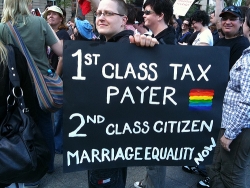Marriage equality has now become law in the ACT. Even prior to the vote being taken, Tony Abbott and his Attorney General Senator George Brandis had announced their intention to stop this legislation, the threat from Brandis being that any same-sex person who married in the ACT would have their marriages declared void.
It seems that this is their intention; not only to forbid marriage equality in Australia but to nullify any and all marriages which do occur. A cynic might consider that this attitude is nothing more than a revenge scenario against same-sex couples who might marry under ACT law. The haste with which the Liberal government has commenced proceedings does little to ally suspicions that prevention of any marriages occurring thereby adding validity to those marriages, is the prime reason for the scramble to get to court.
Abbott’s clear intention is to stop gay marriage, and at all costs. One must consider that these words spoken on the 23rd August and just a matter of days prior to the election, were for electioneering purposes only.
In another step on the road to a likely eventual change in the Australian law, Opposition Leader, Tony Abbott, now says the policy on the same-sex marriage will be decided by the party room after the election.
Tony Abbott has made an important shift in the Liberal position on gay marriage.
Should there be further sly comments from Abbott that the policy of the Liberal party is that there would be no shift towards marriage equality, and that this was the policy that he took to the election, then remind him of these words. Current weasel words are:
‘‘It is not a question of being for or against gay marriage – it’s a question of adhering to the constitution,’’ Mr Abbott told Fairfax Radio in Melbourne.
And Tony Abbott for one has absolutely no intention of changing this – after all according to Abbott gay relationships are nothing other than “a lifestyle choice”. At least he didn’t add, thus the unclean and doers of abominations shalt rot in the seven fires of Hell.
Tony Abbott and George Brandis seem intent on rejecting the rights of some Australian citizens to marry and for no other reason than their own perceptions of what is “a moral code”. Brandis might use the public excuse of “inconsistency”, but while speaking against amending the Marriage Act to redefine marriage, Senator George Brandis said:
[traditional marriage] views reflect the entire understanding and the entire course of human history of what a marriage is.
This of course is highly debatable; that marriage as it is currently expressed in Australian Federal legislation is in any way representative of what marriage has been during “the entire course of human history”, however, what it does do is to provide the real reasons, which are only a little to do with consistency between state and federal legislation and a lot to do with the discriminatory attitudes of the two main players; Tony Abbott and George Brandis.
Whether or not the ACT legislation will be successfully challenged is an issue for Constitutional lawyers and the High Court. Brandis’s argument that all state and federal laws should be consistent does not appear to be as valid as one might think, given that there are a number of other inconsistencies between jurisdictions, and should Abbott choose to do as he has promised and change racial discrimination legislation in support of Andrew Bolt, this will add to these inconsistencies.
The ACT legislation has given a previously excluded section of Australian society the right to marry. The High Court must therefore decide whether or not to take away these rights, and if it should choose to do so, consider whether this would set a precedent to allow the government to take away the rights of other groups of people. I am hopeful in this regard, as the High Court has always had the tendency towards inclusion rather than exclusion.
Tony Abbott is determined not to allow such legislation to proceed due to his own personal beliefs, however, the question which needs to be considered is whether Abbott as Prime Minister should be considering whether it is right that his own personal convictions should be the vehicle to prevent others from fully participating in all the benefits of Australian society: as citizens.
Mr Abbott please consider; this is not an “ungodly intimacy”, but rather society’s acceptance that those who love should have the right to marry.

